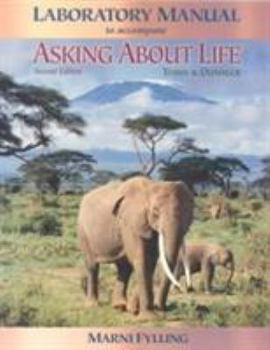Laboratory Manual for Tobin/Dusheck's Asking about Life, 2nd
Learn through experimentation with ASKING ABOUT LIFE, Third Edition. This biology textbook includes thought-provoking chapter-opening stories and helps you remember main ideas with key questions at... This description may be from another edition of this product.
Format:Paperback
Language:English
ISBN:0030270510
ISBN13:9780030270512
Release Date:September 2000
Publisher:Cengage Learning
Length:264 Pages
Customer Reviews
5 ratings
Biology for the non biologist, interesting, & informative, New views.
Published by Thriftbooks.com User , 15 years ago
Outstanding book. Makes biology & the study of life very interesting. Great detail, but not overwhelming. Many illustrations that are first class & very instructive. Highly recommend.
Regarding Science-Ejected Vitalism, 2004:
Published by Thriftbooks.com User , 16 years ago
Vitalism is a profoundly science-ejected concept, though many CAM or 'natural health' cabals falsely claim that vitalism survives scientific scrutiny. I quote: "nineteenth century chemists firmly believe that all biological processes were chemical in nature. To believe otherwise, to insist on some mysterious role for living organisms that was not purely chemical in nature, was condemned as vitalism -- the belief that living systems have powers beyond those of nonliving systems [p.109...] modern biologists reject vitalism, the belief that living systems have powers beyond those of nonliving systems [p.124]." -r.c.
Asking About Life
Published by Thriftbooks.com User , 18 years ago
The book was new and I found out later that a similar new book like this one would retail for $125 and I got it for $13.50. I got a deal!b
What a Great Textbook
Published by Thriftbooks.com User , 21 years ago
I don't usually review (or even read) textbooks. However, in researching a forthcoming book, I've spent a lot of time with Tobin and Dushek's Asking About Life. It's made my life much easier.As those who are familiar with Asking About Life know, this is a textbook with a philosophy. That philosophy is to present biology not as a canonical set of facts about life, but as a dynamic, ongoing dialogue with nature, in which real people who happen to be scientists ask meaningful questions and take understandable steps over time to discover answers to them. The book mixes an engaging narrative style, a strong historical perspective, great examples, and authoritative factual knowledge into an eminently readable, extremely informative, and scientifically impeccable text. As a result, a student or reader can turn to this book not simply to learn about the structure of DNA or how the human immune system functions, but also about Rosalind Franklin's role in discovering the double helix and about why HIV "continues to perplex medical researchers." And, as shown by the book's section headings (How Do Zygotes Cleave? How Does Gastrulation Set Up the Three-Layered Structure?), it embodies the truth that the best scientific questions start not with "what" but with "how."Asking About Life is also full of beautiful, crystal-clear photos and illustrations, many of which, like the text, do a wonderful job of depicting not just static objects, but dynamic processes.I can't imagine a better biology textbook.Robert Adler, Ph.D.,author of Science Firsts: From the Creation of Science to the Science of Creation (Wiley & Sons, Sept. 2002).
Nice book
Published by Thriftbooks.com User , 21 years ago
I used this book for my AP biology course. Thanks to this book, it let me got 5 on the AP exam. I'm homeschooled, I learnt biology myself,well, maybe not cause this book taught me all of the materials to score high on biology.I'm glad I used this book.By the way, the supplementary CD is very helpful,so if you buy this text, i suggest you also to buy that CD.




